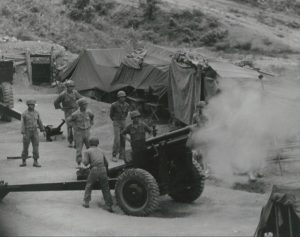The Role of Cyber in Great Power Competition.
Unconventional Warfare, or UW, is a coined term used by Special Operations Command. In essence, UW is when an elite squad of highly trained operators conducts missions to assist in resolving a conflict or threat that, in most cases, resides outside of their home nation. UW, unlike conventional warfare, is often covert and relies on subversion and guerrilla warfare.
An example of guerilla tactics includes Operation Neptune Spear, the raid on Osama Bin Laden’s Pakistan compound in 2011. This operation to capture Bin Laden was a carefully and expertly planned operation executed by a group of elite members under JSOC. However, with the continued rise of cyberattacks, the battlespace is shifting into a new frontier called cyber warfare. This shift is already impacting how UW is conducted and through this shift will emerge a new hybrid fighting force.
History
The term Unconventional Warfare dates back to the 3rd century B.C. and Roman General Quintus Fabius Maximus Verrucosus, the man credited with inventing many of the original tactics of guerrilla warfare (most commonly known as the Fabian strategy).
 In the U.S., UW became an official strategy that was implemented in the 1950s and was the basis of the first Army Special Forces Operations unit in 1952 (Psychological Warfare Division).
In the U.S., UW became an official strategy that was implemented in the 1950s and was the basis of the first Army Special Forces Operations unit in 1952 (Psychological Warfare Division).
UW later became a tactic used to effectively combat guerrilla forces in Laos and Vietnam in the 1960s, with the ideology that trained guerrilla forces would stand a better chance against those already present; to match the enemy’s training.
Since then, Special Operators have been responsible for taking on various threats throughout the years, including those in Afghanistan, Syria, Iraq, and other countries. The special operations forces are composed of highly trained and specialized Soldiers who work in specific locations with specific missions. They focus on deploying and integrating into the culture while remaining out of sight unless combat is necessary,
UW was primarily focused on physical threats such as ISIS and other terrorist units, ISIS. But a new enemy has surfaced: cyber threat actors. Cyber threat actors pose a new set of challenges. Cyberwarfare is increasingly becoming the preferred attack vector for many adversaries (Russia, Iran, North Korea, China), forcing UW methodologies to shift and adjust tactics in order to better defend the country.
What is Cyber Warfare?
 Cyberwarfare, or “an act of war using internet-enabled technology to perform an attack on a nation’s digital infrastructure,” is becoming an increasingly potent threat to all countries and their governments.” A serious cyberattack could trigger Article 5, where an attack against one ally is treated as an attack against all” according to Jens Stoltenberg, NATO Secretary-General.
Cyberwarfare, or “an act of war using internet-enabled technology to perform an attack on a nation’s digital infrastructure,” is becoming an increasingly potent threat to all countries and their governments.” A serious cyberattack could trigger Article 5, where an attack against one ally is treated as an attack against all” according to Jens Stoltenberg, NATO Secretary-General.
The most potent examples of cyber warfare include ransomware attacks, cyber espionage, and other digital attacks capable of degrading or destroying a nation’s critical infrastructure through one successful breach of a network. The cyber threatscape can hold the convenience of everyday life at risk, as witnessed during the Colonial Pipeline attack, which crippled millions of American energy supplies, sparking a national crisis. Some of these damages have caused the loss of life and hundreds of millions paid in ransom.
“Cyber has changed the battlespace as we once knew it”
The Future Battlespace
The dynamics between the battlespace and Soldier are fluid and ever-changing. As technology emerges and grows, so have the world powers seated at the “executive table.” In 2019, China was the first country to send an unmanned rover to the far side of the moon. We have self-driving cars and predictions that in 5 years, we could take trips to Mars. Technology is growing and maturing in unimaginable ways, thus impacting how we fight.

The expertise of Special Operations Soldiers could be layered into a defense force to better fight cyberwar. For example, leveraging the capabilities to hide in plain sight among the enemy as a tool to conduct social engineering. The intelligence gained through social engineering could be the exact data needed to break into an enemy network, thus preventing another catastrophic and deadly attack.
Another example of how this hybrid force could work is using technology to help the Soldiers collect data about their enemy. The same tooling is available to the enemy to scrape data from electronics or pull PII data from different websites, and social media is available to others.
Combining the effectiveness of U.S. Special Forces with technology could very well be the start of an almost impenetrable defense force: collaborative, adaptable, and doctrinally formalized.
The hybrid approach combining Special Operations UW in cyber warfare helps mitigate the likelihood of successful large-scale attacks through early warning and effective action. The United States is behind, and policymakers must find a way to usher in this paradigm shift in Special Operations doctrine empowered by the cyber domain of war.

Jaclyn “Jax” is a tenured Special Operations Warrant Officer, with over 17 years of experience. She is an expert in military cyber policy and has led global development operations in cyber countermeasures to mitigate near-peer attacks. She is a tech blogger, podcaster, entrepreneur, and senior analyst in Global Intelligence. She is committed to her growth as a leader and is currently co-authoring a cybersecurity book and finishing her Master’s in Cybersecurity Risk Management at Georgetown University.





